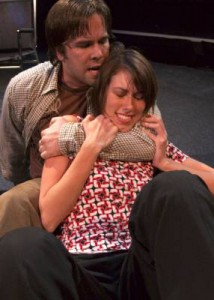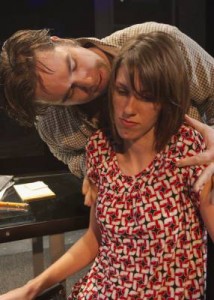RECOMMENDED
An unshaven, disheveled young man carrying a backpack arrives at the office
of book editor Evelyn Ayles, who is seated at her desk. Too busy (or too above
it all) to even look the man in the eye, Evelyn simply points to a chair and keeps
on talking on the phone as if he were not present. Finally she tells him (still not
making eye contact), “You’ve wasted your time coming here today,” and
tosses back the “clichéd” manuscript he has sent to her, then returns to
ignoring him. The man persists, “This is my life, and you call it a cliché!” And
then, before Evelyn even has a chance to see what he’s doing, the young
man removes a plastic strip from his pocket and locks her into her own office.
“You’re not going anywhere until we can talk,” he declares. “I want to talk to
you about my son.”
The man is Jason Carroway, and the son he wants to talk about is his six-year-
old who was raped and murdered, all because Jason let go of his hand for a
mere second. Because Jason needed two hands to light his cigarette, he lost
his son, his wife, and himself to a “pervert lying in wait in the bushes.”
The pervert in question has written a #1 best-seller, Confessions Of A Mass
Murderer and Evelyn Ayles has edited his book. “I always wanted to meet the
woman who turned my son’s killer into a celebrity,” he tells her, murder in his
own eyes.
And things get violent…
These are but the opening minutes of Graham Farrow’s Talk About The
Passion, now getting its California premiere at the Chance Theatre. Farrow’s
70-minute one-act is clearly a story “straight out of today’s headlines” in a
society where reality TV rules, paparazzi stalk celebrities’ every move, and
every Tom, Dick, and Harry wants his 15 minutes of fame.
As an acting showcase, Talk About The Passion most definitely succeeds. It
also mostly works as an indictment of mass media for whom journalistic ethics is
passé. The play is less successful in terms of logic and believability.
Chance Theatre member Casey Long once again proves himself one of the
company’s greatest assets in his performance as a young father driven to the
breaking point by a senseless and horrific crime and the exploitation of this
crime by a self-serving book editor. In his most powerful performance yet, Long
fearlessly exposes the depths of Jason’s grief and anger, and the brutality of
which this man is capable.
Joining Long is Laurel Feierbach as Evelyn. Feierbach is especially believable in
the play’s early scenes. Standing half a head taller than Long, the model-
slender Feierbach is the picture of arrogance and privilege that her high-
power job affords her. She also does very good work when Farrow’s script
requires her own emotional breakdown under Jason’s attack.
Somewhat problematic are several scenes in which Evelyn behaves in ways
which stretch the audience’s credibility, for which playwright Farrow must take
most of the responsibility. Evelyn quite conveniently has her own “story” to tell,
and then makes a suggestion to Jason which seems awfully well thought out
for something supposedly spur of the moment.
Farrow has also provided a surprise ending which, although initially powerful,
ends up quickly raising the question, “If X already had Y in his/her possession,
why didn’t he/she use it sooner?”
Director David Colwell has done a fine job in shaping his actors’ performances
and keeping the tension high and non-stop. Martin Noyes deserves highest
marks for choreographing the two actors’ violent confrontations. Lighting (by
Jeff Brewer), sound (by Dave Mickey), costumes (by Erika C. Miller), and
projections by John MacDonald are all the usual first-rate Chance Theatre
creations.
Set designer Joe Pew also deserves credit for creating a set for the
concurrently running Assassins which transforms effectively into Evelyn Ayles’
executive office. Nevertheless, a reconfigured Chance stage with half the
audience facing the other half (which works to perfection in Assassins) proves
distracting here, with the faces of half the audience providing an intrusive
backdrop to the two characters who should be the entire focus of our
attention. Also, in at least one extended sequence, Feierbach’s back was
turned to my side of the audience, preventing us from knowing her reactions
to Long’s accusations. Those on the other side may have had similar
complaints in other scenes.
Still, Talk About The Passion proves once again that the Chance does indeed
take chances, and while not entirely successful, it boasts some fine acting, and
subject matter which provides food for plenty of post-play discussion and
thought.
Chance Theatre, 5552 E. La Palma Avenue, Anaheim Hills.
www.chancetheater.com
–Steven Stanley
February 10, 2008
Photos: Doug Catiller




 Since 2007, Steven Stanley's StageSceneLA.com has spotlighted the best in Southern California theater via reviews, interviews, and its annual StageSceneLA Scenies.
Since 2007, Steven Stanley's StageSceneLA.com has spotlighted the best in Southern California theater via reviews, interviews, and its annual StageSceneLA Scenies.







 COPYRIGHT 2024 STEVEN STANLEY :: DESIGN BY
COPYRIGHT 2024 STEVEN STANLEY :: DESIGN BY